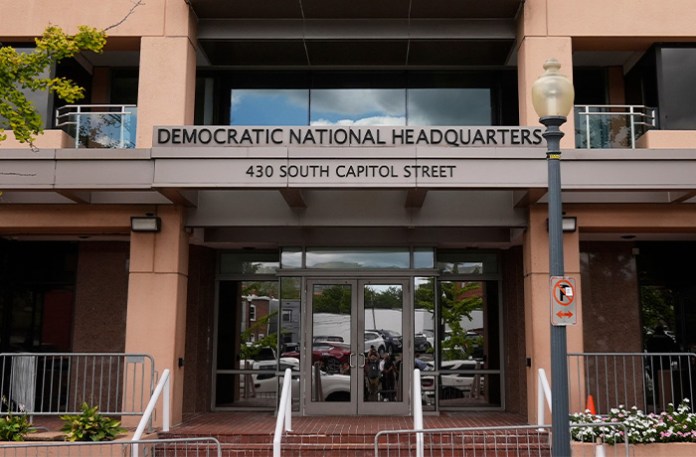Activists: GA Board Has One More Chance To Safeguard Elections
On August 19, the Georgia State Election Board, which is predominantly Republican, will reconsider a proposal to transition to hand-marked paper ballots for voting. This initiative is championed by a group of bipartisan activists who believe it could enhance election security and address the problems seen during the 2020 election. Notably, former President Donald Trump has publicly endorsed moving to paper ballots during various events, indicating his support for such measures.
Currently, Georgia utilizes a touchscreen voting system that generates a paper summary but has been flagged for vulnerabilities by experts. Despite warnings from Republican Secretary of State Brad Raffensperger about these issues, they remain unaddressed until after the upcoming November elections. Activists argue that, under current state law, hand-marked ballots should be available during emergencies or when electronic systems fail.
After a comprehensive proposal was rejected in a previous board meeting due to concerns about legislative overreach, a revised, temporary proposal was submitted for consideration. This new rule aims to ensure the use of hand-marked ballots until the vulnerabilities are corrected, with a sunset clause set for July 2026.
Advocates for the proposal stress its importance for securing the integrity of elections, especially with growing cybersecurity concerns. However, board members have shown reluctance to act decisively, citing their limited roles. The fate of this proposal lies with the five members of the State Election Board, who are urged to consider the potential risks associated with the current voting system.
On Monday, Aug. 19, the Georgia State Election Board (SEB) — which has a majority of Republican members — will have a final opportunity to vote on a proposal to move the state to hand-marked ballots. It’s a proposal that a group of bipartisan activists say could save the state’s election from high risk and potentially avoid some of the issues that plagued the 2020 election.
Moving to paper ballots is the type of proposal that former President Donald Trump has expressed support for on numerous occasions, including at a recent Atlanta rally in which he said moving to “paper ballots” would be ideal. He reiterated his support for hand-marked ballots during an event on Thursday at his Bedminster golf club, where he said, “We should have one-day voting paper ballots.”
The Federalist inquired with the Trump campaign as to whether the former president supports this particular proposal in a state in which he narrowly lost a race that was fraught with irregularities and miscounts. We did not receive a response at the time of publication.
Georgia voters currently cast their vote on a touchscreen, which then prints out a paper summary that includes a QR code. But the system is vulnerable according to experts — and it’s a problem that Republican Secretary of State Brad Raffensperger has been aware of for at least three years.
Since the vulnerabilities have yet to be fixed — and won’t be until after the November election — a group of bipartisan activists have put forward proposals requiring the state return to hand-marked ballots. As Morgan County Democrat Party Chairwoman Jeanne Dufort previously explained to The Federalist, “the only component that changes is in the voting station. … The voter will be handed a paper ballot and a sharpie and they will mark their ballot before going over to a scanner and everything else will flow in the exact same way it has in elections since we adopted the system.”
Dufort further told The Federalist that “the legislature mandates using the touchscreens to mark ballots only when they can be used safely, and otherwise use hand marked ballots until the unsafe situation is resolved — we want the State Election Board to apply the facts to the law.”
A “comprehensive” version of the proposal, as described by Executive Director of the Coalition for Good Governance Marilyn Marks, was shot down by the board during their Aug. 6 meeting. Members of the board expressed concern that by adopting the proposal, they would be legislating rather than creating rules “within the confines of the law,” as board member Janelle King explained.
Marks retorted, however, that the proposal does not ask the SEB to create new law. Instead, Marks points to current state law, which says in part that election superintendents shall have a “sufficient number of blank paper ballots” in the event of an “emergency.” The law also states that if an “emergency situation makes utilizing the electronic ballot markers impossible or impracticable,” then the poll officer shall issue paper ballots to voters instead.
“All we’re doing here is saying, ‘Well, in addition to when the power goes out or the lines are long, if the system has been compromised, or if you cannot otherwise meet the law, then that’s one other condition that you go to [hand-marked ballots].’”
These proposals argue that the SEB should require the state’s backup balloting system (hand-marked paper ballots) be used to conduct the November election to mitigate the known vulnerabilities in the current touchscreen system.
Since the board rejected the original, “comprehensive” proposal Marks put forward, she has submitted a new, slimmed-down temporary version for consideration during Monday’s meeting. This version, provided to The Federalist, would sunset in July 2026. Marks explained in an email to the SEB ahead of Monday’s vote that the temporary rule “is designed to operate under the long-standing statute for the immediate future when the voting system is impractical or improper to use for a specific reason related to specified conditions.”
Marks further explained the temporary rule is, in part, “in response to the specific vulnerabilities confirmed by CISA.” The temporary rule requires the current touchscreen system be used once again when the vulnerabilities have been “mitigated.”
“The last hope for a secure, transparent, verifiable November election rests in the hands of 5 individuals, the State Election Board members, who have the authority and the duty to order the only fail-safe way to vote in Georgia in 2024 — hand marked ballots, counted by scanners/tabulators, with audited outcomes,” Marks said in a statement to The Federalist.
“But, even as irrefutable cybersecurity evidence mounted that the system is at high risk of manipulation in 2024, SEB members continue to refuse to act to date, chanting in unison, ‘Not my job.’ They instead seem to rely on the shallow evidence-free platitudes issued by Raffensperger’s office that the election is secure,” Marks continued.
The president of America First Tea Party, Debbie Dooley, is proposing a similar rule that would require the state switch to hand-marked ballots, so the board has the opportunity to hear both proposals.
“The Secretary of State has had ample time to install the [security] patches to correct the vulnerability,” Dooley said in a statement to The Federalist. “They chose not to. Too many people feel that their vote doesn’t count. The SEB has the power and duty to have Georgia conduct a fair, accurate and verifiable election with their vote on Monday.”
“They should vote with the interest of the Georgia voters in mind,” Dooley continued.
Dooley also noted that SEB member Dr. Janice Johnson acknowledged during the previous board hearing that hackers managed to infiltrate election equipment in four Georgia counties this year alone.
“What happens if hackers launch an attack on Election Day?” Dooley asked. “If hand marked paper ballots are used, the voters will be able to vote because you can’t hack sharpies and paper.”
Despite Johnson’s acknowledgment, however, she expressed skepticism during the meeting that the board has the power to move the state to hand-marked ballots.
Should the board vote in favor of either proposal, it would then go to the rulemaking process.
The fate of the country could potentially hinge on the outcome in Georgia — it’s only fair that the outcome is determined by legitimate votes. Utilizing paper ballots is one way that can be done.
Brianna Lyman is an elections correspondent at The Federalist. Brianna graduated from Fordham University with a degree in International Political Economy. Her work has been featured on Newsmax, Fox News, Fox Business and RealClearPolitics. Follow Brianna on X: @briannalyman2
" Conservative News Daily does not always share or support the views and opinions expressed here; they are just those of the writer."




